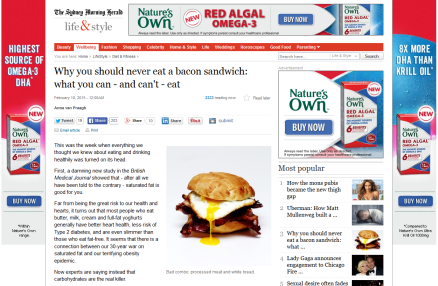The Sydney Morning Herald (via the Telegraph, London) has published another “no-nonsense-straight-shooting-science-based” listicle of the foods YOU SHOULD NEVER EAT AGAIN! These lists seem to appear at least once every week on some form of news website.
This current list is prefaced with references to recent British Medical Journal studies that turned upside down “everything we thought we knew about eating and drinking healthily”. Instead of saturated fats being “the killer”, it turns out carbohydrates are!
Put down that bacon & egg roll and get yourself a KFC Double-Down sandwich!
Surprisingly the article doesn’t question why these new claims have a stronger knowledge base than previous claims or how we can be sure that in a week there won’t be another “nutritional revolution” that will turn this all on its head and finger protein as Grandpa’s real killer.
Leaving aside the science-base of these claims – not to imply this is unimportant – what is most disturbing about these articles (and this article in particular) is the emphasis on individual food choices as the determining factor of health. “Expert” claims that “every bacon sandwich you eat knocks half an hour off your life” reinforce ideas that my heart disease or your diabetes are reducible to that sandwich or chocolate bar eaten six years ago.
When these factoids are spoken by folks in white coats during times of austerity cuts to health services there is a real danger of compounding already existing public health policy problems by pretending that structural influences can be addressed via a nice social marketing campaign or a Jamie Oliver TV show that teaches people how to cook, garden and “never eat those foods again”.
In the UK (where this article originated) David Cameron recently flagged that sick benefits may be cut from people who are obese and do not lose weight. The rationale for this idea is that obese people can lose weight simply by making “correct” and “healthy” food choices. However, according to Cameron, they aren’t making these choices because life is too good on benefits. Hence, cut the benefits and healthy food choices will be made.
While these listicle articles may be dismissed as “not too serious” or “a bit of fun”, they depend on and reinforce a moralistic and biopolitical perspective on the relation between food, choice and health. This perspective is often used to justify budget cuts to health services due to the expectation that health is simply a matter of individuals making the right choices.
In an article for Public Health Ethics, my colleague Donald B. Thompson and I argue that this perspective is morally and scientifically unjustified. Below is the introduction. If you’d like read the whole thing but the pay wall gets in the way send me an email.
